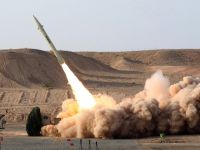In years to come, doddering autocrats and despotic politicians will gaze back on these days with fondness. “Yeah,” they’ll Skype between sips of supersized diet coke, “those were the days.”
In the meantime, Beirut has “Almost There.”
Organized by the Heinrich Boell Stiftung (the cultural organisation of the German Green Party) with the Swiss Embassy, this festival screens documentaries about human rights and migration, often with post-projection conversation with the filmmakers and roundtable discussions on related themes. The event’s fourth iteration is titled “Beyond Limits.”
Running June 13-16 at Metropolis Cinema-Sofil, “Almost There” will stage a pair of roundtable-style discussions (with simultaneous translation), starting with “Women’s Rights as Human Rights,” with panelists Benoite Martin, Marie Wikstrom and Ghida Anani and moderator Marie Forestier.
The next day, June 14, the projection of Monzer Darwish’s 2018 “Syrian Metal is War” will be prefaced by the panel on music, artistic expression and politics. Darwish will share the floor with Simon Stumpf, Shery Bechara, Michelle and Noel Kesrewany and moderator Konrad Siller. The Kesrewany sisters promise to follow the talking with a performance set.
The festival has worked to assemble titles that have been internationally programed and noticed, including one or two that you might not expect to see in such a program.
The films will begin with a projection of “Erased, ___ Ascent of the Invisible,” the feature film debut of Ghassan Halwani. Based in Halwani’s practice as an urban artist, “Erased” offers a dispassionate overview of the culture surrounding those who went missing during Lebanon’s 1975-90 Civil War.
Premiering at the Locarno Film Festival in 2018 and winning prizes at the Carthage Film Festival and the Cairo film festival’s International Critics Week, Halwani’s thoughtful, lyrical work muses over how best to remember the missing in a hostile environment.
“Almost There” will project two more award-winning 2018 features that draw on animation, both recounting the experiences of war correspondents.
Anja Kofmel’s prize-winning “Chris the Swiss,” 2018, digs into the life and death of her cousin, Swiss journalist Christian Würtenberg, who died while covering the Balkan wars, his body found in Croatia in 1992, dressed in a mercenary’s uniform. Raùl de la Fuente and Damian Nenow’s “Another Day of Life” animates renowned Polish reporter Ryszard Kapuscinski’s perilous three-month-long journey across Angola, as the colony’s war of independence against the Portuguese veered toward civil war.
{"preview_thumbnail":"https://cdn.flowplayer.com/6684a05f-6468-4ecd-87d5-a748773282a3/i/v-i-0…","video_id":"030887e8-dafe-4aa0-a275-ef27c8ad659f","player_id":"8ca46225-42a2-4245-9c20-7850ae937431","provider":"flowplayer","video":"Trump Praises ‘Deal’ With Mexico Despite Doubts"}
The second day of projections commences with “an exclusive sneak preview” of Lina Sinjab’s doc “Madness in Aleppo.” (Interested viewers should pre-register at [email protected].)
Amber Fares’ 2015 debut “Speed Sisters” defies expectations that all West Bank-set docs must show Israelis killing stone-throwing Palestinians. Instead she profiles the five drivers of the Arab world’s first-ever all-women’s streetcar racing team, otherwise a men-run shard of Palestinian pop culture.
Julia Bacha’s 2017 “Naila and the Uprising” recounts stories of another group of Palestinian women, those Gazans who in 1987 created an underground network devoted to organising mass demonstrations later called the First Intifada, the most vibrant nonviolent mobilization in Palestinian history.
Taking up the culture of bald-faced lies that autocrats use to hold political power, Hans Pool’s 2018 “Bellingcat: Truth in a Post-Truth World” profiles the “citizen investigative journalist” organization (Bellingcat) and touts the promise of open-source investigative journalism in this age of “alternative fact.”
The festival returns to Lebanon’s Civil War with a projection of “Tadmor,” by UMAM Documentation and Research founders Monika Borgman and Lokman Slim. The 2016 doc focuses on a group of former Lebanese detainees of the prison that ranks high among the Assad regime’s archipelago of dire facilities. As in Raed Anddoni’s “Ghost Hunting,” the filmmakers recruit a cast of former detainees to rebuild their prison and, assuming the roles the guards and prisoners, recreate the systematic torture and humiliation they underwent.
Several titles examine the Syrian conflict. Produced by Bidayyat for Audiovisual Arts, the Beirut-based Syrian film-incubation nonprofit, Saeed al-Batal and Ghaith Ayoub’s 2018 “Still Recording” won five prizes at its premiere in the Venice Film Festival’s International Critics Week. Informed by Ayoub and Batal’s efforts to document regime forces’ 2011-2015 siege of Douma, the doc unfolds as a series of tableaux depicting the chaos in Eastern Ghouta and Damascus’ adjacent neighborhoods, and the opposition’s efforts to prevent the disorder from collapsing into sheer anarchy.
The programming surprise is “Warda /An Open Rose,” Ghassan Salhab’s cinematic essay about the extant traces of Rosa Luxemburg (1871-1919), the Polish-born German political thinker best-known for her leftist revolutionary thought - and for having been murdered in her prison cell by German police.
“Warda” is not an historical profile of Luxemburg the militant. Rather it’s an impressionistic mingling of archival images of Berlin in WWI and Weimar periods and photos of Luxemburg and her colleagues with an assortment of historic and contemporary images and footage from Germany and elsewhere, including Lebanon.
It’s free too.
This article has been adapted from its original source.








